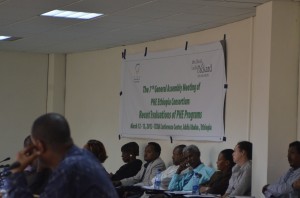Shining a Light on Protecting People and the Planet
Mar 20th, 2013 | By admin | Category: Environment/SustainabilityBy Suzanne York, www.howmany.org
If you are concerned at all about world population growth, human rights (and especially women’s rights), and protecting the environment, then you should know about how PHE (Population, Health and Environment) programs can effectively address these issues.
PHE projects are relatively new in the development sector, but this holistic approach recognizes the interconnection between natural resource management, family planning/reproductive health, and sustainable livelihoods. If you’re an American citizen, your taxpayer dollars are funding some of these projects around the world.
Currently I am attending the PHE Ethiopia Consortium’s 7th Annual General Assembly meeting that has brought together Ethiopians from around the country who are involved with PHE programs, along with donors and other interested parties.
PHE projects are especially important for Ethiopia because it can help the country overcome poverty, food insecurity, environmental degradation, unmet needs for family planning, and improve women’s rights.
Here are just a few statistics that highlight the need to invest in Ethiopia:
- The current population of Ethiopia is nearly 90 million people, and it is projected to double by the year 2050 (Ethiopia is the 2nd most populous nation in Africa);
- The average woman has 5.4 children;
- Most of the country is rural, with just 16% of the population living in cities;
- Ethiopia’s maternal mortality rate is one of the highest in the world, at 676/100,000;
- 29% of Ethiopians live on $1/day or less.
Given these sobering statistics, it is imperative that solutions be found that can improve the lives of all Ethiopians while at the same time protect vital ecosystems.
What makes PHE so exciting is that it is a multi-sector approach to enable people and communities to overcome the many challenges they face in their daily lives, from high population growth rates to unemployment to severe environmental degradation.
Yemeserach Belayneh from the David & Lucille Packard Foundation, a major funder of PHE projects, noted that this is a good way of engaging people in the climate change discussion. It certainly has much potential as a positive way to deal with changing climates. In Ethiopia climate change is affecting coffee production, a critical export crop.
PHE projects in Ethiopia are still in an early phase, and much of the conference was devoted to how to monitor and evaluate projects and share best practices. It was mentioned that more international literature and reviews need to be undertaken to show governments and donors the potential of PHE work.
In the meantime, the people at this conference strongly and enthusiastically support PHE projects, and it was infectious to be in the same room with them. Dr. Meshesha Shewarega of the Consortium of Christian Relief & Development Association (CCRDA), an organization that recently became involved with PHE programs, sees it as a solution and told the audience that “the fate of our environment is in our hands.”
The global environmental and human rights community should take note of what is happening here and encourage similar work in other areas needing to improve the well-being of people and the ecosystem. It’s time the secret got out.

